
I2TRON – Ausbildungsprogramm für Doktoranden
Teilnehmende Forschungsgruppen

Prof. Dr. med. Rejko Krüger (LIH, LCSB) Und Dr. Feng He, co-supervisor (LIH)
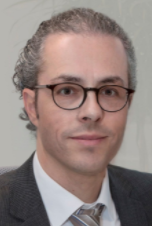
Kruger
Prof. Krüger ist Professor für Neurowissenschaft am Luxembourg Centre for Systems Biomedicine der Universität Luxemburg und Leiter der Initiative Transversal Translational Medicine am Luxembourg Institute of Health. Seine klinische und experimentelle Forschung zur Parkinson-Erkrankung wird von einem „Excellence Grant“ (PEARL) des luxemburgischen Forschungsfonds (Fonds National de la Recherche, FNR) unterstützt. Er kam 2014 an die Universität Luxemburg, nachdem er neun Jahre als außerplanmäßiger Professor für Neurologie an der Universität Tübingen sowie als Leiter des Labors für funktionelle Neurogenomik am Hertie-Institute für klinische Hirnforschung in Tübingen, Deutschland, tätig war.
Er verfügt über mehr als 20 Jahre Erfahrung im klinischen Bereich und in der Forschung mit besonderem Interessenschwerpunkt auf der Genetik neurodegenerativer Erkrankungen; daraus sind bisher mehr als 150 wissenschaftliche Publikationen hervorgegangen (> 20.000 Zitationen, h-Index von 49). Er koordiniert das National Center for Excellence in Research on Parkinson’s Disease (NCER-PD), das vom FNR gefördert wird. Darüber hinaus betreut er Patienten mit Bewegungsstörungen am Centre Hospitalier de Luxembourg. Er ist derzeit als wissenschaftlicher Gutachter für verschiedene internationale Fachzeitschriften mit hohem Impact-Faktor sowie im Auftrag von für die Forschungsförderung zuständigen Stellen tätig und ist darüber hinaus Vorsitzender des internationalen Konsortiums Genetic Epidemiology of Parkinson’s Disease (GEoPD). Prof. Krüger wird regelmäßig zu internationalen Konferenzen zu den Themen Parkinson-Erkrankung und Bewegungsstörungen eingeladen und war 2019 Fakultätsmitglied auf der World Parkinson’s Conference (Kyoto, Japan) und dem Congress of the Movement Disorders Society (Nizza, Frankreich). Als Hochschullehrer hat Prof. Krüger bereits 19 angehende Ärzte (MD) und Doktoranden (PhD) während ihrer erfolgreichen Dissertation betreut und betreut derzeit 6 Doktoranden (PhD) und 2 angehende Ärzte (MD) an der Universität Luxemburg. Seit 2017 unterstützt das Gesundheitsministerium Prof. Krüger bei der Leitung integrierter Konzepte für die Gesundheitsversorgung neurodegenerativer Erkrankungen in Luxemburg: das „Programme Démence Prévention“ (eine Initiative zur Demenzprävention) und ParkinsonNet Luxembourg (ein Versorgungnetzwerk von Fachkräften aus dem Gesundheitswesen für die Parkinson-Erkrankung).
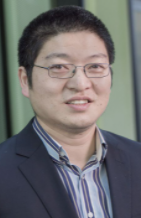
Hue
Dr. He ist Principal Investigator und leitet die Group of Immune Systems Biology (GISB) im Department of Infection and Immunity am LIH. Nach Abschlüssen an der Tianjin University in Bioverfahrenstechnik (Biochemical Engineering) promovierte er (mit einer kumulativen Dissertation) in experimenteller Systembiologie an der Technischen Universität Braunschweig, Deutschland, und dem Helmholtz-Zentrum für Infektionsforschung (HZI) und wurde dabei von Prof. An-Ping Zeng betreut. In seiner Zeit als Postdoc bei Prof. Rudi Balling ist er der Erste, der den Analyseansatz nach dem Prinzip „guilt-by-association“ (Schuld durch Zugehörigkeit) anpasst und anwendet, um neue Schlüsselgene aus dem Netzwerk von Genkorrelationen abzuleiten, das aus Zeitreihen-Transkriptomikdaten aufgebaut wird; daran schloss sich eine umfangreiche experimentelle Validierung sowohl in Mausmodellen als auch menschlichen T-Zellen an. Mit ihrer Erfahrung auf dem Gebiet von groß angelegten Netzwerkinterferenz- und dynamischen Analysen koordiniert seine Gruppe bedeutende Projekte zu Netzwerkbiologie-geführten Experimenten, um biomedizinische Entdeckungen in der Systemimmunologie zu beschleunigen, insbesondere auf dem Gebiet von Immunalterung und personalisierter Immunologie. Derzeit ist er im Herausgebergremium der Fachzeitschrift „Network and Systems Medicine“ sowie als Gutachter für verschiedene Fachzeitschriften und Stellen für die Vergabe von Fördermitteln, unter anderem UK MRC, tätig.
Prof. Dr. Markus Ollert und Dr. Cathy Leonard, co-supervisor (LIH)

Ollert
Prof. Ollert ist klinischer Wissenschaftler mit einer breiten Palette anerkannter Qualifikationen in Dermatologie und Allergologie. Seit der Gründung des Department of Infection and Immunity (DII) ist er dessen erster Direktor und zudem Professor für klinische Allergologie an der University of Southern Denmark, Odense University Hospital. Bevor er ans LIH kam, war er Scientific Director der Clinical Research Division of Molecular and Clinical Allergotoxicology an der Technischen Universität München (TUM), einem der fünf deutschen Exzellenzzentren in der Allergieforschung, das als Sonderforschungsbereich vom deutschen Bundesministerium für Bildung und Forschung (BMBF) gefördert wird, außerdem war er Deputy Chairman des Department of Dermatology and Allergy. Vor seinem Umzug nach Luxemburg hatte er eine Professor in molekularer Dermatologie und Immunologie an der TUM, München, Deutschland, inne. Er war außerdem Gründungsmitglied der Graduate School in Information Science and Health (GSISH) an der TUM in München, die von der Exzellenzinitiative der Deutschen Forschungsgemeinschaft (DFG) gefördert wird.
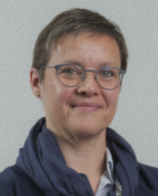
Leonard
Dr. Leonard promovierte in Molekular- und Zellbiologie an der Katholischen Universität Löwen (UCLouvain) in Belgien. Seit 2003 arbeitet sie in der Allergologie, wobei ihr besonderes Interesse der allergenspezifischen Immuntherapie (AIT) gilt. In der Gruppe Allergology and Clinical Immunology (Department of Infection and Immunity) unter Leitung von Prof. Ollert beschäftigt sie sich hauptsächlich mit der Entwicklung von Tiermodellen der AIT. In jüngster Zeit hat das Team eine neuartige Rolle von CpG als toleranzinduzierendes Adjuvans für die AIT in einem präklinischen Modell einer Katzenallergie evaluiert. Das Team interessiert sich insbesondere für die weitere Charakterisierung der zellulären und molekularen Mechanismen, die dem etablierten Modell zugrunde liegen, und möchte damit neue, auf die Überführung in den klinischen Bereich anwendbare Erkenntnisse gewinnen, mit denen das Wohlbefinden von unter Allergien leidenden Patienten verbessert werden kann.
Prof. Dr. Dirk Brenner (LIH, LCSB)
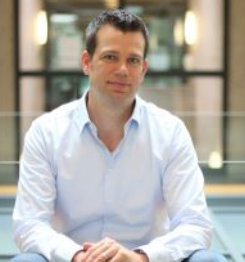
Brenner
Prof. Brenner ist ,Full Professor of Immunology and Genetics‘ und Principal Investigator sowohl am LIH als auch am LCSB. Er ist stellvertretender Leiter des Department of Infection and Immunity am LIH und außerdem Adjunct Professor of Allergology an der Southern University of Denmark.
Prof. Brenner kann sowohl als Erstautor als auch als Senior Author auf eine lange Liste von Publikationen mit hohem Impact-Faktor auf den Gebieten Immunologie, Stoffwechsel und Krebs verweisen. Er und sein Labor haben sich auf In-vivo-Anwendungen spezialisiert und in jüngster Zeit einen wesentlichen Beitrag zu unserem Verständnis geleistet, wie der Stoffwechsel die Immunität kontrolliert.
Prof. Brenner studierte Biochemie an den Universitäten Bonn und Witten/Herdecke (Deutschland), an der Stanford und der Harvard University (USA) und promovierte am Deutschen Krebsforschungszentrum in Heidelberg in der Gruppe von Prof. Dr. Peter H. Kammer. Als Postdoc ging er an das renommierte Labor von Prof. Dr. Tak W. Mak, Ontario Institute, Toronto (Kanada).
Prof. Brenner erhielt ein Stipendium der Alexander von Humboldt-Stiftung (Deutschland) und ein Fellowship des Cancer Research Institute (USA) sowie mehrere weitere nationale und internationale Auszeichnungen. Durch die Förderung als FNR-ATTRACT-Fellow (Luxemburg) kam er nach Luxemburg.
Dr. Andy Chevigné und Dr. Bassam Janji, co-supervisor (LIH)

Chevigné
Der Forschungsschwerpunkt des Teams von Dr. Chevigné liegt auf T-Protein-gekoppelten Rezeptoren (G protein-coupled receptors, GPCRs), die an virusinduzierten Erkrankungen, Entzündung und Krebs beteiligt sind. Es stützt sich dabei auf verschiedene intern entwickelte zelluläre Assays und moderneste Techniken, mit denen die hochaktuellen Aspekte der Ligandenbindung und Signaltransduktion von GPCRs untersucht werden können. Zu ihren bedeutendsten Leistungen bei der Erforschung der Determinanten, welche die Erkennung, Aktivierung und Modulation von GPCRs durch endogene und virale Liganden steuern, gehört die Identifizierung einer neuen Virus-Wirt-Interaktion im Zusammenhang mit GPCRs sowie die erfolgreiche Anwendung der Phagenanzeigetechnologie, um auf Antikörperfragmenten basierende Antagonisten von GPCRs zu entwickeln.

Janji
Dr. Janji ist Co-Supervisor für Dr. Chevigné und leitet zudem sein eigenes Projekt in dieser DTU (siehe weiter unten).
Prof. Mahesh Desai und Dr. Bassam Janji , co-supervisor (LIH)
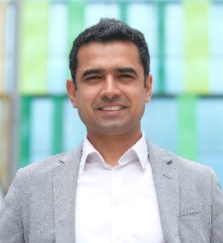
Desai
Mahesh S. Desai ist Gruppenleiter des Teams Eco-Immunology and Microbiome am Luxembourg Institute of Health und Adjunct Associate Professor im Fach ,Darmmikrobiom in Gesundheit und Krankheit‘ an der University of Southern Denmark, Odense, Dänemark. Er ist Gastwissenschaftler am RIKEN Centre for Integrative Medical Sciences, Yokohama, Japan. Er promovierte an der International Max Planck Research School, Marburg, Deutschland und setzte seine Ausbildung als Postdoc an der University of Michigan Medical School, Ann Arbor, USA, fort. Das Mikrobiom im Darm wird ganz wesentlich von der Ernährung beeinflusst, und dennoch werden die Mikrobiom-vermittelten Mechanismen, die den Zusammenhang zwischen der Ernährung mit verschiedenen Erkrankungen bestimmen, nur ansatzweise verstanden. Der Forschungsschwerpunkt im Desai-Lab liegt auf der Erkennung dieser Mechanismen und der zugrunde liegenden immunologischen Prozesse über Interaktionen des Mikrobioms mit der Darmschleimhautbarriere, die als erste Verteidigungslinie gegen die eindringenden Krankheitserreger dient. Da die moderne Ernährung in Industrieländern deutlich weniger Ballaststoffe enthält, möchte sein Labor verstehen, welche Auswirkungen das Darmmikrobiom bei Ballaststoffentzug auf unsere Gesundheit hat und inwiefern dies zu Störungen wie entzündlichen Darmerkrankungen, Lebensmittelallergien und Multiple Sklerose beiträgt. In einer wegweisenden, in Cell veröffentlichten Studie haben Desai und seine Kollegen gezeigt, dass ein Darmmikrobiom bei Ballaststoffentzug die Darmschleimhautbarriere schwächt und die Anfälligkeit für enteritische Krankheitserreger erhöht. Sein Team hat sich zum Ziel gesetzt, Ernährungstherapien zu entwickeln, die die Schleimhautbarriere stärken und die Gesundheit verbessern. Er hat mehrere Auszeichnungen erhalten, darunter die Tissier-Medaille der Japan Bifidus Foundation.

Janji
Dr. Janji promovierte in Onkologie an der Universität Paris und arbeitete als Postdoc am „Institut Curie“ in Paris. Ans Luxembourg Institute of Health (LIH) kam er, um ein Forschungsprogramm über die Rolle von Hypoxie in der Regulation der Tumorimmunität einzurichten. 2011 erlangte er seine Forschungshabilitation (HDR, Habilitation à Diriger des Recherches) an der Universität Paris-Saclay und wurde 2019 zum Leiter der Gruppe Tumor Immunotherapy and Microenvironment (TIME) ernannt. Die Gruppe von Dr. Janji arbeitet an der Definition innovativer Behandlungsstrategien, um den Nutzen der Immuntherapie von Krebs bei verschiedenen soliden Tumoren zu verbessern.
Dr. Carole Devaux und Dr. Jacques Zimmer, co-supervisor (LIH)
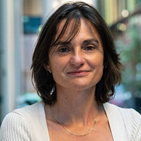
Devaux
Die von Dr. Devaux geleitete HIV Clinical and Translational Research (HIV-CTR) Group möchte neues translationales Wissen über die Behandlung von HIV unter Verwendung humanisierter Mausmodelle bereitstellen, insbesondere Wissen über die HIV-spezifische Reaktion auf zytotoxische Untergruppen von CD8-T-Zellen und NK-Zellen. Ein weiterer Schwerpunkt ihrer Forschung liegt auf der Entwicklung heteromultimerischer multifunktionaler therapeutischer Moleküle, welche die Wirkung des Komplements in Richtung von Zielzellen aktivieren, sowie auf antiviralen Wirkstoffen, die aus Naturprodukten abgeleitet sind. Die Gruppe beteiligt sich als Partner in mehreren europäischen HIV- und HCV-Netzwerken.

Zimmer
Dr. Jacques Zimmer, MD, PhD, ist Experte für die Biologie natürlicher Killerzellen (NK-Zellen). Nach seiner Promotion in Straßburg, Frankreich, arbeitete er als Postdoc am Ludwig Institute for Cancer Research in Lausanne, Schweiz, in der Gruppe von Prof. Werner Held. Derzeit ist er Gruppenleiter im Department of Infection and Immunity des LIH. In seiner Forschung beschäftigt er sich mit NK-Zellen im Zusammenhang mit Immundefekten (TAP-Defizienz, Good-Syndrom) und mit Infektionskrankheiten.
Dr. Annette Kühn and Dr. Christiane Hilger, co-supervisor (LIH)

Kühn
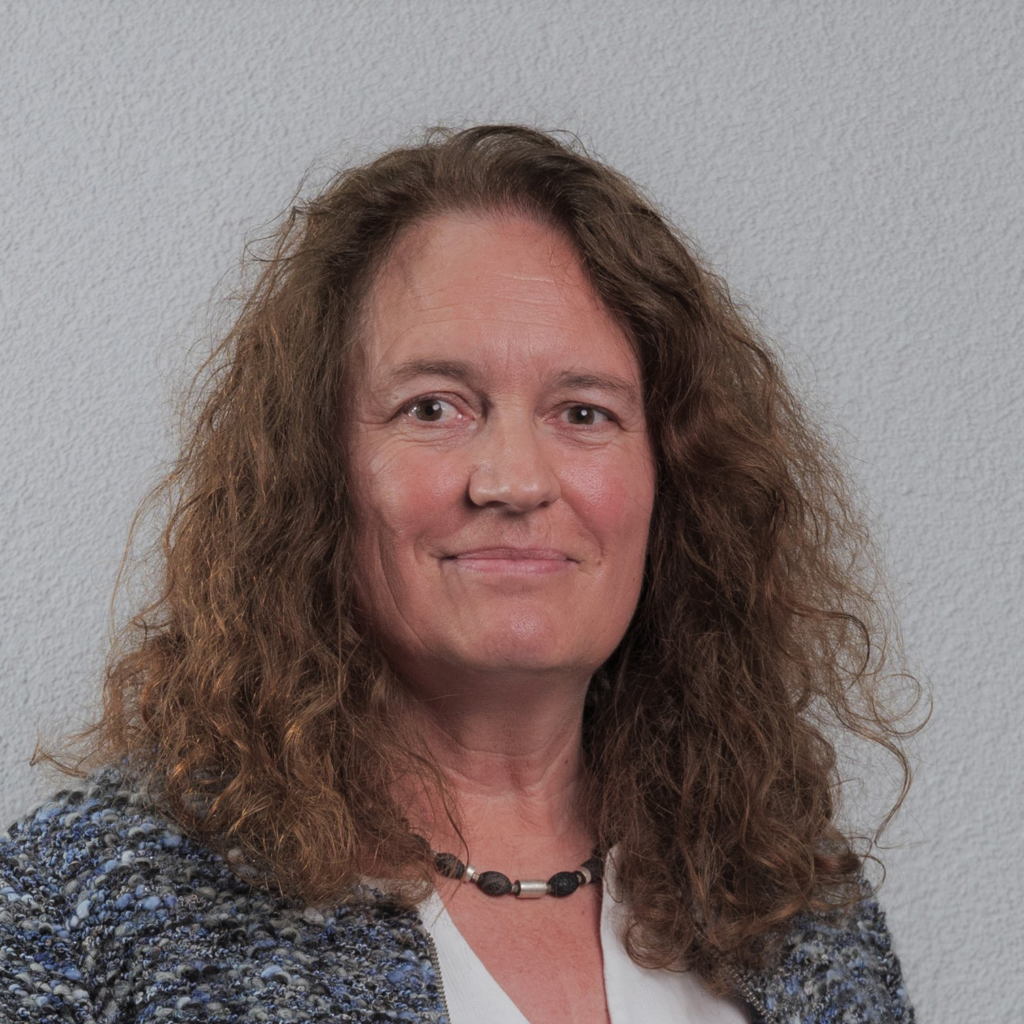
Hilger
Dr. Kühn und Dr. Hilger sind Forschungsgruppeleiterinnen im Department of Infection and Immunity am Luxembourg Institute of Health. Beide sind Expertinnen für die molekulare und immunologische Charakterisierung von Allergenen, den entscheidenden Faktoren bei der allergischen Sensibilisierung und Auslösung der Reaktion. Ihr Spezialgebiet sind Atemwegs- und Lebensmittelallergien. In ihren translationalen Studien hat sich die Gruppe die Erstellung umfassender Patientenprofile zum Ziel gesetzt, um eine Stratifizierung nach den zugrunde liegenden Endotypen vornehmen zu können. Dies soll schließlich eine bessere klinische Versorgung von Allergiepatienten ermöglichen. Der Forschungsoutput der PIs stellt einen wichtigen Beitrag auf dem Gebiet der molekularen Allergologie dar.
Dr. Johannes Meiser (LIH)
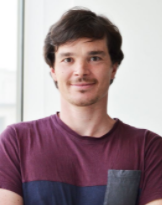
Meiser
Während seiner erfolgreichen Postdoc-Aufenthalte am Luxembourg Centre for Systems Biomedicine und am Beatson Institute von Cancer Research UK in Glasgow, wo er als Research Fellow gefördert wurde, spezialisierte Dr. Meiser sich auf dem Gebiet des Stoffwechsels von Säugetierzellen mit Schwerpunkt Krebs und Immunstoffwechsel. Anschließend wechselte er erfolgreich auf eine Stelle als Principal Investigator am LIH, die im Wesentlichen durch Mittel aus dem ATTRACT-Programm des luxemburgischen Forschungsfonds FNR gefördert wird (ein mit 1,5 Mio. € ausgestattetes 5-jähriges Tenure-Track-Programm). Dank zusätzlicher externer Förderung innerhalb und außerhalb von Luxemburg ist das Labor auf inzwischen 7 Mitglieder gewachsen.
Dr. Alessandro Michelucci (LIH)
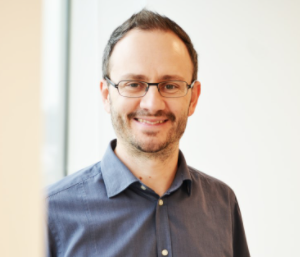
Michelucci
Dr. Michelucci ist Zell- und Molekular-Neurowissenschaftler und leitet die Neuro-Immunology Group am LIH. Seine Gruppe hat sich zum Ziel gesetzt, die immunologischen Eigenschaften von residenten Immunzellen im Gehirn zu identifizieren, wobei Mikroglia hier die zentralen Effektorzellen darstellen. Außerdem sollen ihre Crosstalk-Effekte gegenüber peripheren Immunzellen unter kanzerogenen oder neurodegenerativen Bedingungen untersucht werden, um spezifische Programme zu identifizieren, die als Targets für eine therapeutische Intervention genutzt werden könnten. Da unangemessene Reaktionen von Immunzellen oft Erkrankungen des Gehirns begünstigen, sind ihre zugrunde liegenden zellulären und molekularen Mechanismen nämlich in jüngster Zeit als potenzielle therapeutische Targets stärker ins Blickfeld gerückt.
Dr. Simone Niclou und Dr. Anna Golebiewska, co-supervisor (LIH)
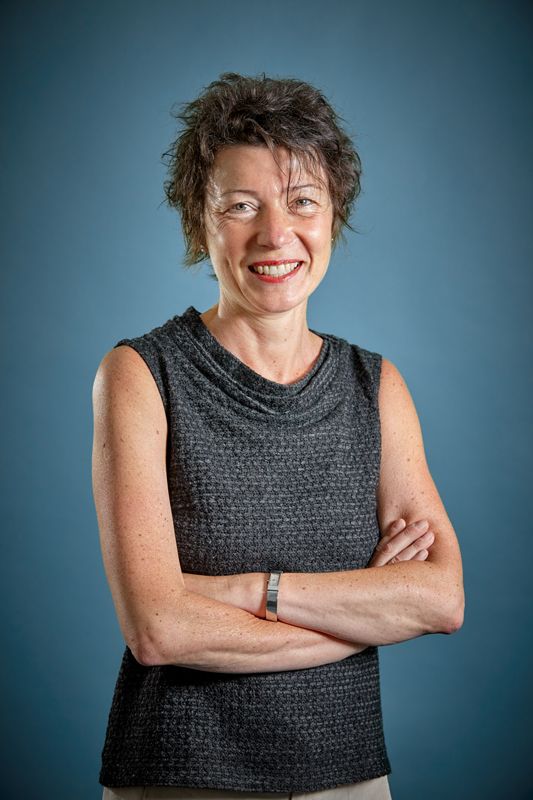
Niclou
Dr. Niclou ist Direktorin des Department of Cancer Research am LIH. Sie leitet das NORLUX Neuro-Oncology Laboratory am LIH und ist Adjunct Professor an der Universität Bergen in Norwegen. Dr. Niclou ist ausgebildete Neurologin und seit 2005 in der Hirntumorforschung tätig. Ihr Interessenschwerpunkt liegt in der Biologie diffuser Gliome, wobei sie sich insbesondere mit dem Stoffwechsel von Gliomen, der Heterogenität und Plastizität sowie mit der Angiogenese und Invasion von Tumoren beschäftigt. Das Labor hat einen einzigartigen Bestand an patientenbasierten Tumororganoiden und vom Patienten abgeleiteten orthotopen Xenotransplantat-Modellen (orthotopic patient-derived xenograft, PDOX) aufgebaut. Die Hauptmotivation von Dr. Niclou ist es, neue Einblicke zu gewinnen, die im klinischen Bereich umsetzbar sind und einen Nutzen für die Patienten bieten.

Golebiewska
Dr. Golebiewska ist Gruppenleiterin im NORLUX Neuro-Oncology Laboratory. Nach dem Studium der Molekular- und Zellbiologie promovierte sie auf dem Gebiet der Stammzellenforschung. Ihr Arbeitsschwerpunkt liegt auf dem Verständnis der Biologie von Hirntumoren und der Entwicklung klinisch relevanter Tiermodelle. Ihr besonderes Interesse gilt den verschiedenen Aspekten der Heterogenität von Tumoren und der Hypothese von Krebsstammzellen. In ihren aktuellen Projekten beschäftigt sie sich mit der intrinsischen Plastizität, die es Hirntumorzellen ermöglichen, sich anzupassen und trotz des Drucks von außen durch Einflüsse der Mikroumgebung und durch die Behandlung zu überleben.
Dr. Jérôme Paggetti und Dr. Etienne Moussay, co-supervisor (LIH)
Paggetti
Dr. Paggetti leitet die Gruppe Tumor Stroma Interactions im Department of Oncology am LIH seit 2017. Sein Forschungsschwerpunkt in der Hämatoonkologie liegt auf dem Wechselspiel zwischen Leukämiezellen und ihrer Mikroumgebung, insbesondere im Immunsystem, unter Verwendung von Patientenproben und präklinischen Mausmodellen. Die Gruppe besteht jetzt aus 10 Mitgliedern (5 Doktoranden, 2 Postdocs, 1 Ingenieur und 2 Gruppenleiter). Er hat Kooperationen mit bekannten Universitäten und Krebsforschungsinstituten in Europa eingerichtet und mehrere wissenschaftliche Preise erhalten, darunter 2016 die Auszeichnung des luxemburgischen Forschungsfonds FNR für eine herausragende Publikation.
Moussay
Dr. Moussay leitet die Gruppe Tumor Stroma Interactions des Department of Oncology am LIH seit 2015. Sein Forschungsschwerpunkt in der Hämatoonkologie liegt auf dem Wechselspiel zwischen Leukämiezellen und ihrer Mikroumgebung, insbesondere im Immunsystem, unter Verwendung von Patientenproben und präklinischen Mausmodellen. Die Gruppe besteht jetzt aus 10 Mitgliedern (5 Doktoranden, 2 Postdocs, 1 Ingenieur und 2 Gruppenleiter). Er hat Kooperationen mit bekannten Universitäten und Krebsforschungsinstituten in Europa eingerichtet und mehrere wissenschaftliche Preise erhalten, darunter 2012 und 2016 die Auszeichnung des luxemburgischen Forschungsfonds FNR für herausragende Publikationen.
Dr. Clément Thomas und Prof. Dr. med. Michel Mittelbronn, co-supervisor (LIH)
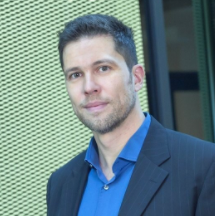
Thomas
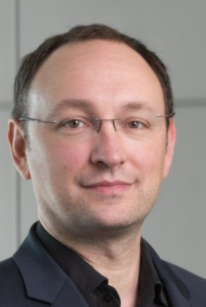
Mittelbronn
Im Mittelpunkt der Forschung von Dr. Thomas stehen die Funktionen und Regulationsmodi des Aktinzytoskeletts in eukaryotischen Zellen, wobei sein besonderes Interesse den Aktin-gesteuerten Prozessen gilt, die dem Fortschreiten und der Metastasierung von Krebs zugrunde liegen. In einer neueren Studie hat seine Gruppe nachgewiesen, dass eine bestimmte Struktur des Zytoskeletts, die sich in Tumorzellen bei einem Angriff durch zytotoxische Lymphozyten bildet, einen einzigartigen Konvergenzpunkt für eine Vielzahl von Evasionsmechanismen darstellt und somit einen vielversprechenden therapeutischen Ansatzpunkt für eine Intervention bietet, um bei den Patienten eine wirksame Immunität gegen den Tumor wiederherzustellen.
Dr. Torsten Bohn und Dr. Hanen Samouda, co-supervisor (LIH)

Bohn
Dr. Bohn ist Leiter der Nutrition and Health Research Group im Department of Population Health (DoPH). Als ausgebildeter Ernährungswissenschaftler und Lebensmittelchemiker beschäftigen sich er und sein Team hauptsächlich mit dem Verhältnis von Ernährung, insbesondere von Mikronährstoffen und sekundären Pflanzenstoffen, zur Gesundheit mit dem Schwerpunkt Entzündungen/oxidativer Stress. Außerdem ist er Adjunct Associate Professor an der Universität Luxemburg, Chefredakteur des International Journal for Vitamin and Nutrition Research (Int. J. Vitam. Nutr. Res.), hat sich an mehreren EU-COST Actions beteiligt und verschiedene über Drittmittel finanzierte Forschungsprojekte geleitet. Er ist auch Mitglied des Scientific Network on Food Consumption Data der Europäischen Behörde für Lebensmittelsicherheit EFSA.
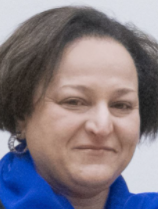
Samouda
Dr. Hanen Samouda ist klinische Anthropologin und Epidemiologin. Ihre Arbeit ist darauf ausgerichtet, ein besseres Verständnis der Mechanismen zu gewinnen, die hinter der Entwicklung einer gesundheitsbezogenen Ernährung und den Bedingungen der Körperzusammensetzung stehen, mit besonderem Schwerpunkt auf Adipositas, kardiometabolischen Komorbiditäten, dem Mikrobiom und Alterungsprozessen. Im Zentrum ihrer Forschungsaktivitäten stehen die Untersuchung des Adipositas-Paradoxons, die Entwicklung und Bewertung von Adipositas-Managementprogrammen sowie Studien zu ektopischem Fett als Gesundheitsdeterminante. In einer neueren Arbeit hat sie einfach anzuwendende und genaue Werkzeuge zur Bewertung von viszeraler Adipositas entwickelt, die ein bedeutender Risikofaktor für Herz-Stoffwechsel-, onkologische und neurodegenerative Erkrankungen ist. In einer bevölkerungsbasierten Studie über einen Zeitraum von zwanzig Jahren wurden diese anthropometrischen Werkzeuge als die genauesten Prädiktoren für Herz-Stoffwechsel-Leiden, Krebs und frühzeitigen Tod (kardiovaskuläre, Krebs und alle Ursachen für Mortalität) im Vergleich zu den traditionellen Adipositas-Diagnosewerkzeugen validiert, wenn biomedizinische Bildgebung nicht zur Verfügung steht.
Dr. Reinhard Schneider (UL-LCSB)
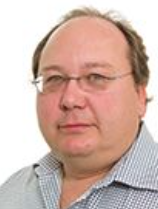
Schneider
Die von Dr. Schneider geleitete Gruppe Bioinformatics Core hat bereits eine Reihe von Projekten zu Management, Umgang mit und Analyse sehr großer Mengen an medizinischen und biologischen Daten entwickelt. Die Gruppe hat erfolgreich Wissensplattformen für große Projekte zur Datenintegration in verschiedenen Krankheitskontexten implementiert. Außerdem implementiert die Gruppe gerade eine IT-Landschaft, die eine Umgebung für reproduzierbare Wissenschaft sicherstellt. Der Bioinformatics Core verfügt über umfassende Kompetenzen in Bioinformatik, Big-Data-Management, Big-Data-Integration und -Analyse sowie in Textanalytik (Text Mining). Bevor Dr. Schneider ans LCSB kam, war er 8 Jahre Gruppenleiter am European Molecular Biology Laboratory (EMBL) in Heidelberg. Er verfügt über einen starken unternehmerischen Hintergrund als Gründer mehrerer Spin-offs.
photo : (c) LCSB/University of Luxembourg
Prof. Dr. Jens Schwamborn (UL-LCSB)

Schwamborn
Prof. Schwamborn promovierte an der Universität Münster. Danach arbeitete er als Postdoc-Forscher am Institut für Molekulare Biotechnologie (IMBA) in Wien und anschließend als PI am Universitätsklinikum Münster. Seit 2013 ist Prof. Schwamborn PI am Luxembourg Centre for Systems Biomedicine und Professor an der Universität Luxemburg.
Sein Forschungsschwerpunkt liegt auf der Nutzung patientenspezifischer, induzierter pluripotenter Stammzellen für die Entwicklung von fortschrittlichen Ansätzen zur In-vitro-Modellierung. In diesem Zusammenhang gilt sein besonderes Interesse der Organoid-Technologie.
Prof. Dr. Paul Wilmes (UL-LCSB)

Wilmes
Prof Wilmes ist Professor für Systemökologie am Luxembourg Centre for Systems Biomedicine der Universität Luxemburg, wo er die Forschungsgruppe Systems Ecology leitet.
Als Chevening-Stipendiat der britischen Regierung erwarb Prof. Wilmes seinen PhD-Abschluss 2006 an der School of Environmental Sciences der University of East Anglia (Vereinigtes Königreich). Für seine Dissertation forschte er einige Zeit als Gastwissenschaftler des Deutschen Akademischen Austauschdienstes am Max-Planck-Institut für marine Mikrobiologie in Bremen (Deutschland). Als Postdoc war Prof. Wilmes anschließend als Forscher an der University of California, Berkeley (USA), tätig, von wo er 2010 durch das Fellowship-Programm ATTRACT des luxemburgischen Forschungsfonds (FNR) ins heimatliche Luxemburg zurückkehrte. Prof. Wilmes erhielt 2019 eine Förderung durch einen Consolidator Grant des Europäischen Forschungsrats (European Research Council, ERC). Er ist gewähltes Vollmitglied des Großherzoglichen Instituts (Institut grand-ducal), Abteilung Naturwissenschaften, Physik und Mathematik (Section des Sciences naturelles, physiques et mathématiques), sowie der Académie Lorraine des Sciences. 2018 wurde Prof. Wilmes vom Großherzoglichen Institut der „Grand Prix in Biological Sciences“ verliehen.
In seiner Forschung beschäftigt sich Prof. Wilmes hauptsächlich damit, durch systembiologische Ansätze ökologische Beziehungen innerhalb und zwischen mikrobiellen Populationen in situ zu enträtseln. Seine Gruppe hat Pionierarbeit in der Entwicklung geeigneter Nass- und Trockenlabormethoden zur Durchführung systematischer molekularer Messungen von mikrobiellen Konsortien über Raum und Zeit geleistet. Dadurch ist es beispielsweise möglich, Lebensstilstrategien klar abgegrenzter Populationen zu definieren und diese mit genetischen und funktionellen Merkmalen zu verknüpfen. Die gleichen Ansätze ermöglichen auch die Untersuchung der molekularen Interaktionen zwischen Mikrobiom und Wirt. In diesem Zusammenhang hat seine Gruppe ein auf Mikrofluidik basierendes In-vitro-Modell der gastrointestinalen Schnittstelle zwischen Mensch und Mikrobe unter dem Namen HuMiX entwickelt.
Prof. Wilmes ist Autor von mehr als 90 durch unabhängige Gutachter geprüften Publikationen und „Highly Cited Researcher“. Er wird häufig als Redner zu internationalen wissenschaftlichen Tagungen und von akademischen Institutionen eingeladen.
Dr. Elisabeth Letellier (UL-DLSM)
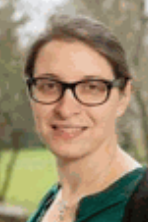
Letellier
Dr. Letellier ist PI und gehört der Leitung der Molecular Disease Mechanisms Group im Department of Life Sciences and Medicine an der Universität Luxemburg (UL) an. Nach dem Studium der Zell- und Molekularbiologie hat sie am Deutschen Krebsforschungszentrum (DKFZ) in Heidelberg promoviert. Seit sie 2009 an die Universität Luxemburg (UL) kam, arbeitet sie zum Thema kolorektales Karzinom (colorectal cancer, CRC) und der Mikroumgebung des Tumors. Gemeinsam mit Prof. Haan, verschiedenen Klinikern, dem LNS, der IBBL und dem LIH hat sie den Anstoß für die Sammlung zum CRC beim Menschen gegeben, die laufend erweitert wird und derzeit 160 CRC-Patienten umfasst. In den letzten 10 Jahren hat ihr Team Kompetenzen in der CRC-Forschung mit dem Schwerpunkt auf der Entwicklung von patientenabgeleiteten 3D-Tumormodellen, einschließlich CRC-Organoiden, aufgebaut, um die molekularen Mechanismen besser zu verstehen, die der Entstehung von Tumoren und der Therapieresistenz zugrunde liegen.
(h-index: 14, i10-index: 17, citations: 992)
Dr. med. Barbara Klink (LNS)
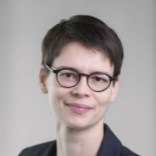
Klink
Dr. Klink ist die Leiterin des National Center of Genetics (LNS). Außerdem leitet sie die neu eingerichtete Forschungsgruppe „Functional Tumor Genomics“ im Department of Oncology (LIH). Dr. Klink ist Humangenetikerin mit einem Forschungs- und klinischen Schwerpunkt auf Tumorgenetik und erblichen Tumorerkrankungen. Sie verfügt über umfassende Fachkompetenz in der genomweiten Sequenzierung und der Beurteilung genetischer Daten im klinischen Kontext. Gemeinsam mit dem LIH, der Universität Luxemburg und klinischen Partnern hat sich Dr. Klink zum Ziel gesetzt, die translationale Krebsforschung und Präzisionsonkologie in Luxemburg zu stärken.
Associate Prof. Dr. rer. nat. Anne Grünewald (UL-LCSB)
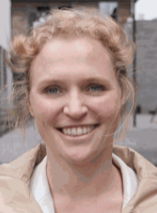
Grünewald
Dr. Grünewald ist ATTRACT-Fellow des luxemburgischen Forschungsfonds FNR und Forschungsgruppenleiterin am LCSB. Nach Forschungsprojekten in Lübeck, London, Sydney und Newcastle kam sie 2016 an die Universität Luxemburg (UL). Ihr Forschungsinteresse gilt der Rolle von mtDNA bei der Parkinson-Erkrankung. Neben I2TRON ist sie PI in den Doctoral Training Units (DTUs) CiTICS und PARK-QC. Bislang hat sie mehr als 50 Artikel publiziert und mehr als 4,5 Mio. EUR an Fördermitteln eingeworben. Dr. Grünewald ist Mitglied im Universitätsrat (Conseil Universitaire) sowie im Gleichstellungsausschuss (Gender Equality Committee) an der UL.
Prof. Dr. med. Frank Hertel (CHL) and Dr Felix Kleine Borgmann (LIH)
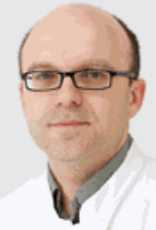
Hertel
Prof. Hertel ist Leiter des Neurosurgical National Department of Luxemburg am Centre Hospitalier de Luxembourg (CHL) und Leiter der Interventional Neuroscience Group am LCSB, Universität Luxemburg (UL).
Dr. Kleine Bormann ist Wissenschaftler am Luxembourg Center of Neuropathology.
Prof Dr med. Rejko Krüger (LIH, LCSB) and Dr Feng He, co-supervisor (LIH)

Kruger
Prof Krüger is Professor of Neuroscience at the Luxembourg Centre for Systems Biomedicine of the University of Luxembourg and Director of Transversal Translational Medicine at the Luxembourg Institute of Health. His clinical and experimental research on Parkinson’s disease is supported by an Excellence Grant (PEARL) from the Fonds National de Recherche (FNR). He joined University of Luxembourg in June 2014 after serving nine years as Associate Professor for Neurology at the University of Tübingen and as Head of the Laboratory for Functional Neurogenomics at the Hertie-Institute for Clinical Brain Research in Tübingen, Germany.
His clinical and research experience extends over 20 years with a special interest focus in the genetics of neurodegenerative diseases, which has resulted in more than 150 scientific publications thus far (>20.000 citations, h-index 49). He coordinates the National Center for Excellence in Research on Parkinson’s disease (NCER-PD), funded by the FNR. Furthermore, he sees patients with Movement Disorders at the Centre Hospitalier de Luxembourg. He is currently a reviewer for various high impact factor international journals and funding agencies, and is president of the international Genetic Epidemiology of Parkinson’s disease Consortium (GEoPD). Prof. Krüger is regularly invited to international conferences in the area of Parkinson’s disease and Movement Disorders and in 2019 faculty member at the World Parkinson’s Conference (Kyoto, Japan) and Congress of the Movement Disorders Society (Nice, France). As an academic teacher, Prof. Krüger supervised 19 MD and PhD students during their successful dissertation, currently supervising 6 PhD and 2 MD students at the University of Luxembourg. Since 2017, the Ministry of Health is supporting Prof. Krüger to lead integrated healthcare concepts for neurodegenerative diseases in Luxembourg: the “Programme Démence Prévention” (an initiative to prevent dementia) and ParkinsonNet Luxembourg (a care network of health care professionals for Parkinson’s disease).

Hue
Dr He is a principal investigator and leads the Group of Immune Systems Biology (GISB) in the Department of Infection and Immunity at LIH. With degrees from Tianjin University in biochemical engineering, he pursued a PhD (cumulative thesis) in experimental systems biology at the Technical University of Braunschweig, Germany and the Helmholtz Centre for Infection Research (HZI) supervised by Prof. An-Ping Zeng. During his postdoc with Prof Rudi Balling, he is the first to adapt and apply the guilt-by-association analysis approach to infer novel key genes from the gene correlation network constructed from time-series transcriptomic data followed by extensive experimental validation in both mice models and human T cells. With expertise in large-scale network inference and dynamic analysis, his group orchestrates major efforts on network-biology-guided experiments in order to accelerate biomedical discoveries in systems immunology, especially in immunoaging and personalized immunology. He currently serves on the editorial board of the journal ‘Network and Systems Medicine’ and reviewers for different journals and granting agencies including UK MRC.
Prof Dr Markus Ollert and Dr Cathy Leonard, co-supervisor (LIH)

Ollert
Prof Ollert is a clinician scientist with board certifications in dermatology and allergology. He is the inaugural director of the Department of Infection and Immunity (DII) and Professor of Clinical Allergology at the University of Southern Denmark, Odense University Hospital. Before joining the LIH he acted as the Scientific Director of the Clinical Research Division of Molecular and Clinical Allergotoxicology at Technische Universität München (TUM), one of the five German national centres of excellence in allergy research funded as a large-scale collaborative research grant by the German Ministry of Education and Science (BMBF), and as Deputy Chairman of the Department of Dermatology and Allergy. Before moving to Luxembourg, he held a professorship in Molecular Dermatology and Immunology from TUM, Munich, Germany. He also was a founding member of the Graduate School in Information Science and Health (GSISH) at TUM in Munich, funded through the Excellence Initiative of the German Research Foundation (DFG).

Leonard
Dr Leonard obtained her PhD in molecular and cellular biology from the UCLouvain in Belgium. Since 2003, she has been working in allergology with specific interest in allergen specific immunotherapy (AIT). Her work in the group of Allergology and Clinical Immunology (Department of Infection and Immunity), under the supervision of Prof Ollert, is centered on the development of animal models of AIT. Recent work performed by the team has evaluated a novel role of CpG as tolerance-inducing adjuvant for AIT in a pre-clinical model of cat allergy. The team is particularly interested to further characterize the cellular and molecular mechanisms underlying the established model with the final goal to generate new insight applicable to clinical translation for improvement of allergic patients’ well-being.
Prof Dr Dirk Brenner (LIH, LCSB)

Brenner
Prof Brenner is ‘Full Professor of Immunology and Genetics’ and Principal Investigator at both LIH and LCSB. He is Deputy Head at LIH-Department of Infection and Immunity and in addition, Adjunct Professor of Allergology at the Southern University of Denmark.
Prof Brenner has a long-standing track record of high impact publications as first, as well as senior author, in the fields of immunology, metabolism and cancer. He and his lab are specialized in in vivo applications and have significantly contributed to our understanding of how metabolism controls immunity in the recent past.
Prof Brenner studied biochemistry at the Universities of Bonn and Witten/Herdecke (GER), Stanford and Harvard University (USA) and obtained his PhD at the German Cancer Research Center, Heidelberg within the group of Prof Dr Peter H Kammer. As a postdoc he joined the prestigious laboratory of Prof Dr Tak W Mak, Ontario Institute, Toronto (CAN).
Prof Brenner was awarded the Alexander von Humboldt foundation (GER) fellowship, and the Cancer Research Institute (USA) fellowship and multiple other national and international awards. The FNR-ATTRACT (LU) consolidator fellowship brought him to Luxembourg.
Dr Andy Chevigné and Dr Bassam Janji, co-supervisor (LIH)

Chevigné
Dr Chevigné’s research team focuses on G protein-coupled receptors (GPCRs) implicated in virus-induced pathologies, inflammation and cancer, and relies on various in-house-established cellular assays and state-of-the art techniques allowing to address the most topical aspects of GPCR ligand binding and signalling. Their main achievements in investigating the determinants driving the recognition, activation and modulation of GPCRs by endogenous and viral ligands include the identification of a new virus-host GPCR interaction and the successful application of the phage display technology to develop antibody fragment-based antagonists of GPCRs.

Janji
Dr Janji is Co supervisor for Dr Chevigne and also leads his own project in this DTU (pls see below).
Prof Mahesh Desai and Dr Bassam Janji , co-supervisor (LIH)

Desai
Mahesh S. Desai is the Group Leader of the Eco-Immunology and Microbiome team at the Luxembourg Institute of Health and is an Adjunct Associate Professor in ‘Gut microbiome in health and disease’ at the University of Southern Denmark, Odense, Denmark. He is working as a visiting scientist at the RIKEN Centre for Integrative Medical Sciences, Yokohama, Japan. He obtained his PhD at the International Max Planck Research School, Marburg, Germany, and underwent postdoctoral training at the University of Michigan Medical School, Ann Arbor, USA. Diet is a major driver of the gut microbiome, yet the microbiome-mediated mechanisms that link diet to various diseases are poorly understood. Research in Desai Lab focuses on discerning these mechanisms and the underlying immunological processes via interactions of the microbiome with the colonic mucus barrier, which serves as the first line of defence against the invading pathogens. Since the modern diet of developed nations includes significantly reduced dietary fiber, his lab seeks to understand how the fiber-deprived gut microbiome impacts our health and contributes to disorders such as inflammatory bowel disease, food allergy and multiple sclerosis. In a landmark study published in Cell, Desai and colleagues showed that a dietary fiber-deprived gut microbiome degrades the colonic mucus barrier and enhances susceptibility to enteric pathogens. His team aims to design dietary therapeutics to strengthen the mucosal barrier and to improve health. He has received several awards including Dr. Tissier’s medal from the Japan Bifidus Foundation.

Janji
Dr Janji obtained his PhD in Oncology from the University of Paris and performed a Post Doc at “Institut Curie” Paris. He moved to Luxembourg Institute of Health (LIH), to set up a research program on the role of hypoxia in the regulation of tumor immunity. In 2011, he obtained HDR diploma (Habilitation to lead Research) from the University of Paris-Saclay, and appointed in 2019 as head of Tumor Immunotherapy and Microenvironment (TIME) group. Dr Janji’s group is involved in defining innovative therapeutic strategies to improve the benefit of cancer immunotherapy in various solid tumors.
Dr Carole Devaux and Dr Jacques Zimmer, co-supervisor (LIH)

Devaux
The HIV Clinical and Translational Research (HIV-CTR) Group led by Dr Devaux is interested in providing new translational knowledge on HIV cure using humanized mouse models, in particular on the HIV-specific response of cytotoxic subsets of CD8 T cells and NK cells. Their research focused also on the development of heteromultimeric multifunctional therapeutic molecules activating the complement action towards target cells and antivirals derived from natural products. The group is a partner in several European HIV and HCV networks.

Zimmer
Dr Jacques Zimmer, MD, PhD, is an expert in natural killer (NK) cell biology. After his PhD thesis in Strasbourg, France, he spent his postdoc time at the Ludwig Institute for Cancer Research in Lausanne, Switzerland, in the group of Prof. Werner Held. He is currently a group leader at the Department of Infection and Immunity of the LIH. His research interests are NK cells in the context of immunodeficiencies (TAP deficiency, Good’s syndrome) and infectious diseases.
Dr Annette Kühn and Dr Christiane Hilger, co-supervisor (LIH)

Kühn

Hilger
Dr Kuehn and Dr Hilger are research group leaders at the Department of Infection and Immunity, Luxembourg Institute of Health. Both are experts in molecular and immunological characterization of allergens, the key drivers in allergic sensitization and elicitation, with specialization in respiratory and food allergy. In translational studies, the research group targets on comprehensive patient profiling in order to stratify those according to underlying endotypes with the overarching perspective to improve the clinical care of allergic patients. The PIs‘ research output constitutes a major contribution to the molecular allergology field.
Dr Johannes Meiser (LIH)

Meiser
During successful postdoctoral stays at the Luxembourg Centre for Systems Biomedicine and the Cancer Research UK Beatson Institute in Glasgow, both supported by competitive individual fellowships, Dr Meiser specialized in the field of mammalian cell metabolism with a focus on cancer and immuno-metabolism. He then successfully transitioned to a Principal Investigator position at LIH, core funded by the FNR ATTRACT program (a 1.5 Mio €, 5-year tenure track program). Due to additional external funding inside and outside Luxembourg, the lab grew until now to a size of 7 members.
Dr Alessandro Michelucci (LIH)

Michelucci
Dr Michelucci is a cellular and molecular neuroscientist heading the Neuro-Immunology Group at the LIH. His group aims to identify the immunological properties of brain resident immune cells, with microglia representing the key effector cells, as well as to investigate their crosstalk with peripheral immune cells under tumorigenic or neurodegenerative conditions in order to identify specific programmes which could represent targets for therapeutic intervention. Indeed, since inappropriate immune cell reactions often support brain diseases, their underlying cellular and molecular mechanisms have recently emerged as potential therapeutic targets.
Dr Simone Niclou and Dr Anna Golebiewska, co-supervisor (LIH)

Niclou
Dr Niclou is Director of the Department of Oncology at LIH. She leads the NORLUX Neuro-Oncology laboratory and is adjunct professor at the University of Bergen in Norway. Trained as a neurobiologist, Dr. Niclou has been engaged in brain tumor research since 2005. Her interest is focused on the biology of diffuse gliomas with a special interest in glioma metabolism, tumour heterogeneity and plasticity, angiogenesis and invasion. The lab has established a unique portfolio of patient-based tumor organoids and orthotopic patient-derived xenograft models (PDOX). Dr Niclou’s key motivation is to generate new insight applicable to clinical translation and patient benefit.

Golebiewska
Dr Golebiewska is Group leader in the NORLUX Neuro-Oncology laboratory. She has a background in molecular and cellular biology and obtained her PhD in the field of stem cell research. Her work focuses on understanding brain tumour biology and development of clinically relevant animal models. She is particularly interested in the various aspects of tumour heterogeneity and the cancer stem cell hypothesis. Her current projects aim to tackle intrinsic plasticity allowing brain tumour cells to adapt and survive external pressures from microenvironmental cues and treatment.
Dr Jérôme Paggetti and Dr Etienne Moussay, co-supervisor (LIH)
Paggetti
Dr Paggetti heads the Tumor Stroma Interactions group in the Department of Oncology at LIH since 2017. His research in hemato-oncology focuses on the interplay between leukemic cells and their microenvironment in particular the immune system, using patient samples and murine pre-clinical models. The group is now composed of 10 members (5 PhD students, 2 Postdocs, 1 engineer and 2 group leaders). He established collaborations with well-known universities and cancer institutes in Europe, and received several scientific prizes including the FNR award for outstanding publication in 2016.
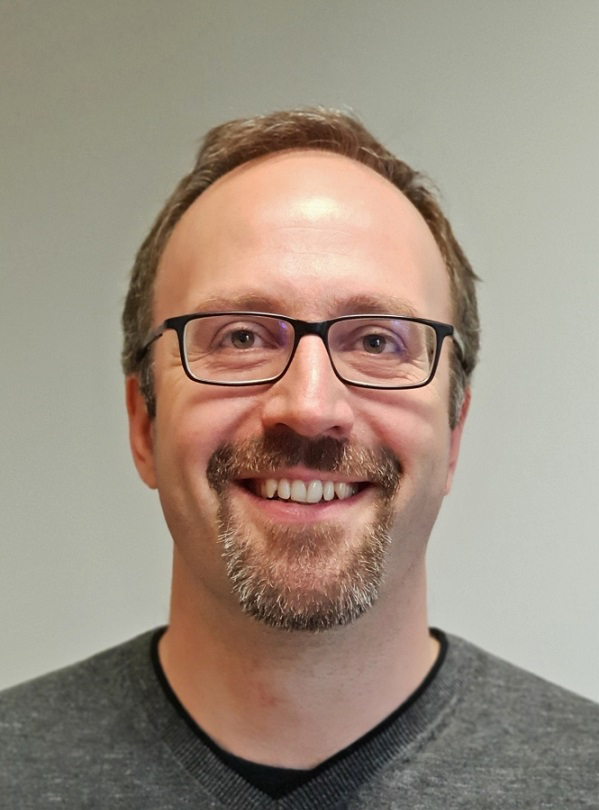
Moussay
Dr Moussay heads the Tumor Stroma Interactions group in the Department of Oncology at LIH since 2015. His research in hemato-oncology focuses on the interplay between leukemic cells and their microenvironment in particular the immune system, using patient samples and murine pre-clinical models. The group is now composed of 10 members (5 PhD students, 2 Postdocs, 1 engineer and 2 group leaders). He established collaborations with well-known universities and cancer institutes in Europe, and received several scientific prizes including two FNR awards for outstanding publication in 2012 and 2016.
Dr Clément Thomas and Prof Dr med. Michel Mittelbronn, co-supervisor (LIH)

Thomas
Dr Thomas’s research is centred on the functions and modes of regulation of the actin cytoskeleton in eukaryotic cells, with a particular interest in actin-driven processes underlying cancer progression and metastasis. In a recent study, his group established that a particular cytoskeletal structure that forms in tumor cells upon cytotoxic lymphocyte attack represents a unique point of convergence for multiple evasion mechanisms and a promising therapeutic point of intervention to restore effective anti-tumour immunity in patients.
Dr Torsten Bohn and Dr Hanen Samouda, co-supervisor (LIH)

Bohn
Dr Bohn is Head of the Nutrition and Health Research Group at DOPH. Being a nutritionist and food chemist by training, he and his team focus on the relation of diet, especially micronutrients and phytochemicals and their relation to health, with a focus on inflammation/oxidative stress. He is also Adjunct Associate Professor at Luxembourg University, Editor-in-Chief of the Int. J. Vitam. Nutr. Res., has participated in several EU-COST actions and has headed various externally funded research projects. He is also member of the EFSA Scientific Network on Food Consumption Data.

Samouda
Dr Hanen Samouda is a clinical anthropologist and epidemiologist. She works on improving the understanding of the mechanisms behind the development of health-related nutrition and body composition conditions, with a particular focus on obesity, cardiometabolic comorbidities, microbiota and ageing processes. Her research activities are centred in particular on investigating the obesity paradox, developing and evaluating obesity management programs, as well on the study of the ectopic fat as determinant of health. In a recent work, she developed easy to use and accurate tools to assess visceral adiposity, a major risk factor for cardiometabolic, oncological and neurodegenerative diseases. These anthropometric tools have been validated as being the most accurate predictors of cardiometabolic conditions, cancer and early death (cardiovascular, cancer and all causes mortality) in a population-based study followed during twenty years, in comparison with the traditional obesity diagnosis tools, when biomedical imaging are not available.
Dr Reinhard Schneider (UL-LCSB)

Schneider
The bioinformatics core facility group headed by Dr Schneider has already developed a number of projects involving the management, handling, and analysis of large-scale medical and biological data. The group has already implemented knowledge platforms for large-scale data integration projects in various disease contexts. Furthermore the group is implementing an IT-landscape ensuring a reproducible science environment. The bioinformatics core has strong expertise in bioinformatics, big data management, big data integration and analysis and text mining. Dr Schneider had been a group leader at the EMBL (Heidelberg) for 8 years before he joined the LCSB. He has very strong enterprise background as founders of several spin-off.
photo : (c) LCSB/University of Luxembourg
Prof Dr Jens Schwamborn (UL-LCSB)

Schwamborn
Prof Schwamborn obtained a PhD from the University Muenster. Afterwards he worked as a postdoctoral researcher at the IMBA in Vienna and then as PI at the University Clinic Muenster. Since 2013 Prof Schwamborn is a PI at the Luxembourg Centre for Systems Biomedicine and Professor at the University of Luxembourg.
The focus of his research is on the usage of patient specific induced pluripotent stem cells for the development of advanced approaches for in vitro disease modeling. In this context he is particularly interested in organoid technology.
Prof Dr Paul Wilmes (UL-LCSB)

Wilmes
Prof Wilmes is Professor of Systems Ecology at the Luxembourg Centre for Systems Biomedicine of the University of Luxembourg, where he heads the Systems Ecology research group.
As a British Chevening Scholar, Prof Wilmes earned his PhD from the School of Environmental Sciences at the University of East Anglia (UK) in 2006. For part of his doctoral research, he spent time as a German Academic Exchange Service Visiting Scientist at the Max Planck Institute for Marine Microbiology in Bremen (Germany). Prof Wilmes subsequently carried out postdoctoral research at the University of California, Berkeley (USA) from where he returned in 2010 to his native Luxembourg through the ATTRACT fellowship scheme of the Luxembourg National Research Fund. Paul received a European Research Council (ERC) Consolidator Grant in 2019. He is an elected full member of the Institut Grand-Ducal, Section des Sciences naturelles, physiques et mathématiques and the Académie Lorraine des Sciences. In 2018, Paul was awarded the Grand Prix in Biological Sciences of the Institut Grand-Ducal.
Prof Wilmes’s main research focus is on using Systems Biology approaches for unraveling fundamental ecological relationships within and between microbial populations in situ. His group has pioneered the development of appropriate wet- and dry-lab methodologies for performing systematic molecular measurements of microbial consortia over space and time. This allows for example to define lifestyle strategies of distinct populations and link these to genetic and functional traits. The same approaches are allowing the study of microbiome-host molecular interactions. In this context, his group has developed a microfluidics-based in vitro model of the human-microbial gastrointestinal interface called HuMiX.
Prof Wilmes has authored more than 90 peer-review publications and is a Highly Cited Researcher. He is a frequently invited speaker at international scientific symposia and academic institutions.
Dr Elisabeth Letellier (UL-DLSM)

Letellier
Dr Letellier is a PI co-heading the Molecular Disease Mechanisms Group at the Department of Life Sciences and Medicine at UL. She has a background in cellular and molecular biology and obtained her PhD at the German Cancer Research Center (DKFZ, Germany). Since joining UL in 2009, she works on colorectal cancer (CRC) and its tumor microenvironment. Together with Prof. Haan, different clinicians, the LNS, the IBBL and the LIH, she initiated the ongoing human CRC collection, which includes currently 160 CRC patients. Over the past 10 years, her team has built up expertise in CRC research with a focus on the development of patient-derived 3D tumor models, including CRC organoids, in order to better understand the underlying molecular mechanisms of tumor initiation and therapy resistance.
(h-index: 14, i10-index: 17, citations: 992)
Dr med. Barbara Klink (LNS)

Klink
Dr Klink is head of the National Center of Genetics (LNS). She also leads the newly established research group “Functional Tumor Genomics” at the Department of Oncology (LIH). Dr Klink is a human geneticist with a research and clinical focus on tumour genetics and hereditary tumor diseases. She has a strong expertise in genome wide sequencing and evaluation of genetic data in the clinical context. Together with the LIH, the University of Luxembourg and clinical partners, Dr Klink aims to strengthen translational cancer research and precision oncology in Luxembourg.
Associate Prof, Dr rer. nat. Anne Grünewald (UL-LCSB)

Grünewald
Dr Grünewald is an FNR ATTRACT Fellow and Research Group Leader at the LCSB. She joined the University of Luxembourg (UL) in 2016 after research periods in Lübeck, London, Sydney, and Newcastle. Her research interest lies in the role of the mtDNA in PD. Beyond I2TRON, she is a PI in the CiTICS and PARK-QC DTUs. To date, she has published >50 articles and acquired >4.5 million EUR of grant support. Dr Grünewald is a member of the University Council and the Gender Equality Committee at the UL.
Prof Dr med. Frank Hertel (CHL) and Dr Felix Kleine Borgmann (LIH)

Hertel
Prof Hertel is head of the national department of neurosurgery at the Centre Hospitalier de Luxembourg (CHL) and head of the Interventional Neuroscience Group at LCSB, UL.
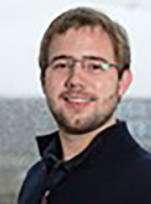
Borgmann
Dr Kleine Bormann is a scientist at the Luxembourg Center of Neuropathology.

i2TRON entdecken
Informationen über MD-PhD-Stellen
Teilnehmende Forschungsgruppen
Governance-Struktur und wissenschaftlicher Beirat
Individuelle Projekte
Berufliche Weiterentwicklung und Ausbildungsmöglichkeiten
Aufnehmende Institutionen und Partner
Kontakt
Für Fragen zu i2TRON, schreiben Sie uns an: i2TRON@lih.lu
